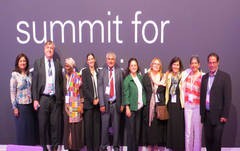
GCED Basic Search Form
Quick Search
Close
当前位置
新闻
Thinking, Sharing and Acting for a Peaceful and Sustainable World - presented at WISE 2014
发布时间:
2015/03/04

Innovation in thinking, sharing and acting for a peaceful and sustainable world is the message UNESCO shared at this years' World Innovation Summit for Education (WISE) conference in Doha, Qatar, 4th-7th November 2014. UNESCO organized several panels and debates at the summit which is one of the largest education events in the world.
At the Education Above All plenary session on "Education Post-2015: The Unfinished Agenda" Hans d' Orville, UNESCO's Assistant Director General for Strategic Planning debated the subject with Thomas Gass, UN Assistant Secretary-General for DESA and Inter-agency Affairs.
Mr d'Orville pointed out the need to adopt a strong stand-alone goal for education, with a set of effective targets which would also integrate the dimensions of the unfinished business from the current Millennium Development Goals. He reiterated the need for evidence based planning and statistics to inform targeted interventions for reaching out-of-school children and prioritized quality for marginalized learners, which UNESCO is uniquely placed to do with the work of UNESCO's Institute of Statistics (UIS). Mr d'Orville also suggested that a strong education goal/indicator should be introduced into the political debate on a par with the unemployment and inflation figures, allowing for a true assessment of a country's well-being.
During a workshop on Global Citizenship Education (GCED) - 'Thinking, Sharing and Acting for a Peaceful and Sustainable World', UNESCO presented this emerging area of education that emphasizes the promotion of knowledge, values, and skills that are needed for ensuring that learners contribute to building more just, peaceful and sustainable world.
The workshop, led by Chris Castle, Chief of Section of Health and Global Citizenship Education, UNESCO, gave the participants the opportunity to learn more about GCED and exchange experiences on the challenges and successes of GCED programs.
"In the world we live in today, GCED plays a critical role in creating long-term peace and stability, and we know that education is the right vehicle to transfer this knowledge and create change in societies. WISE 2014 has provided a platform for concrete discussions on highlighting the necessity of GCED and at the same time placed importance on the need for it to be at the heart of education agendas around the world," Chris Castle, Chief of Section of Health and Global Citizenship Education said.
Oscar Sanchez, Secretary of Education, City of Bogota, Colombia, explained how GCED is implemented in his country and that it has had a positive impact on their society. This initiative is youth-centred and includes half a million students enrolled in the public education system already.
Lynn Davies, Emeritus Professor of International Education, University of Birmingham, UK, outlined the relevance of GCED connected with the rise of extremism, the spread of social media and gender. She raised the question on how GCED can operate in a climate of conflict and oppression, and argued that GCED in all countries ideally needs to include an understanding of the causes of conflict or ethnic and religious tension.
Further, Davies pointed out that young people need skills to critically analyse the social media messages they receive, including religious messages. "At the same time, they need to be able to explore opportunities for positive use of social media for change within and across borders - including e-learning under oppressive regimes," she added.
Dina Kiwan, Associate Professor at the American University of Beirut, Lebanon, also speaking at the workshop, told how GCED is responding to a concrete need for a new approach to education.
Leading educators from around the world highlighted the pivotal role of innovation and creativity in the global education agenda at WISE 2014, which opened under the patronage of Her Highness Sheikha Moza bint Nasser, Chairperson of Qatar Foundation. Her Highness Sheikha Moza presented the WISE 2014 Prize for Education to Ann Lesley Cotton, founder of the Campaign for Female Education (CAMFED) to enhance girls' education in Africa.
网址:
http://www.unesco.org/new/en/education/resources/in-focus-articles/global-citizenship-education/single-view/news/thinking_sharing_and_acting_for_a_peaceful_and_sustainable_world_presented_at_wise_2014/
